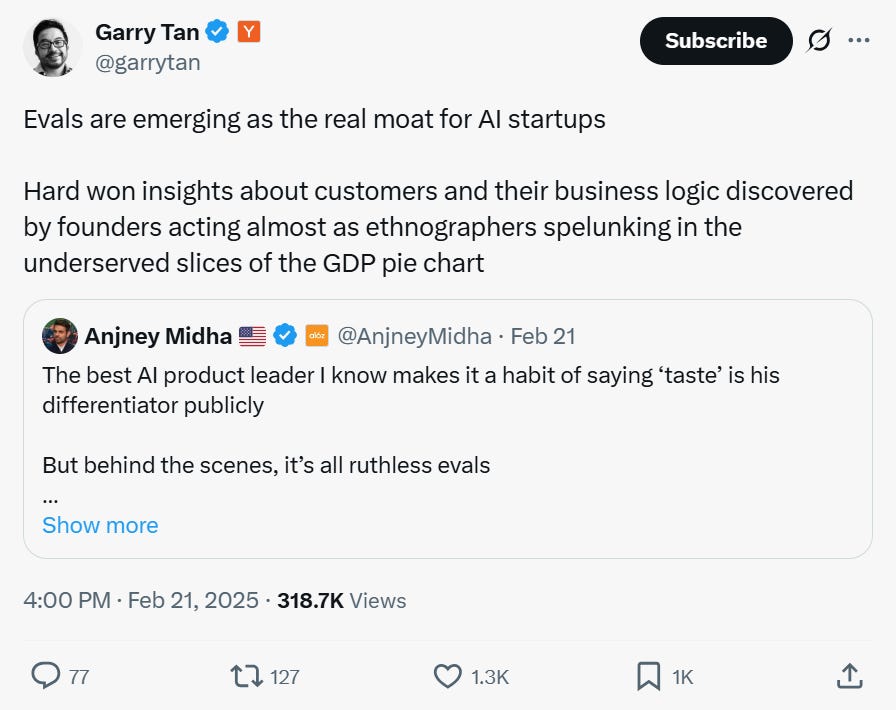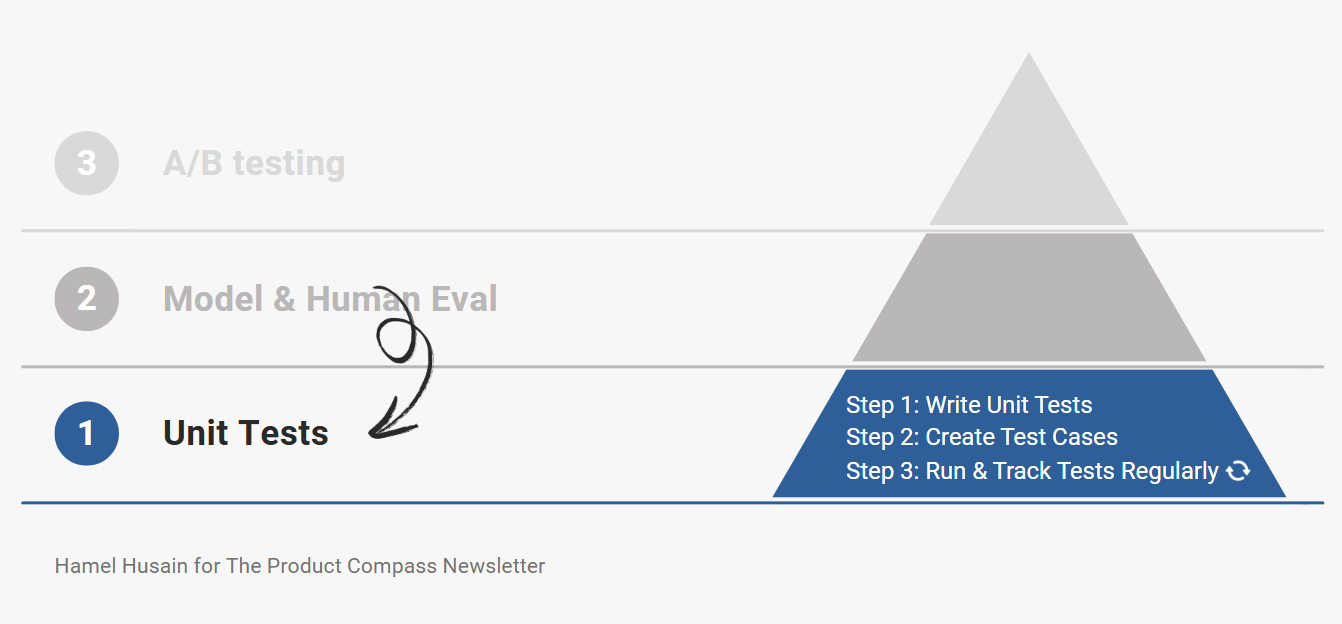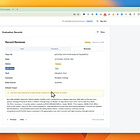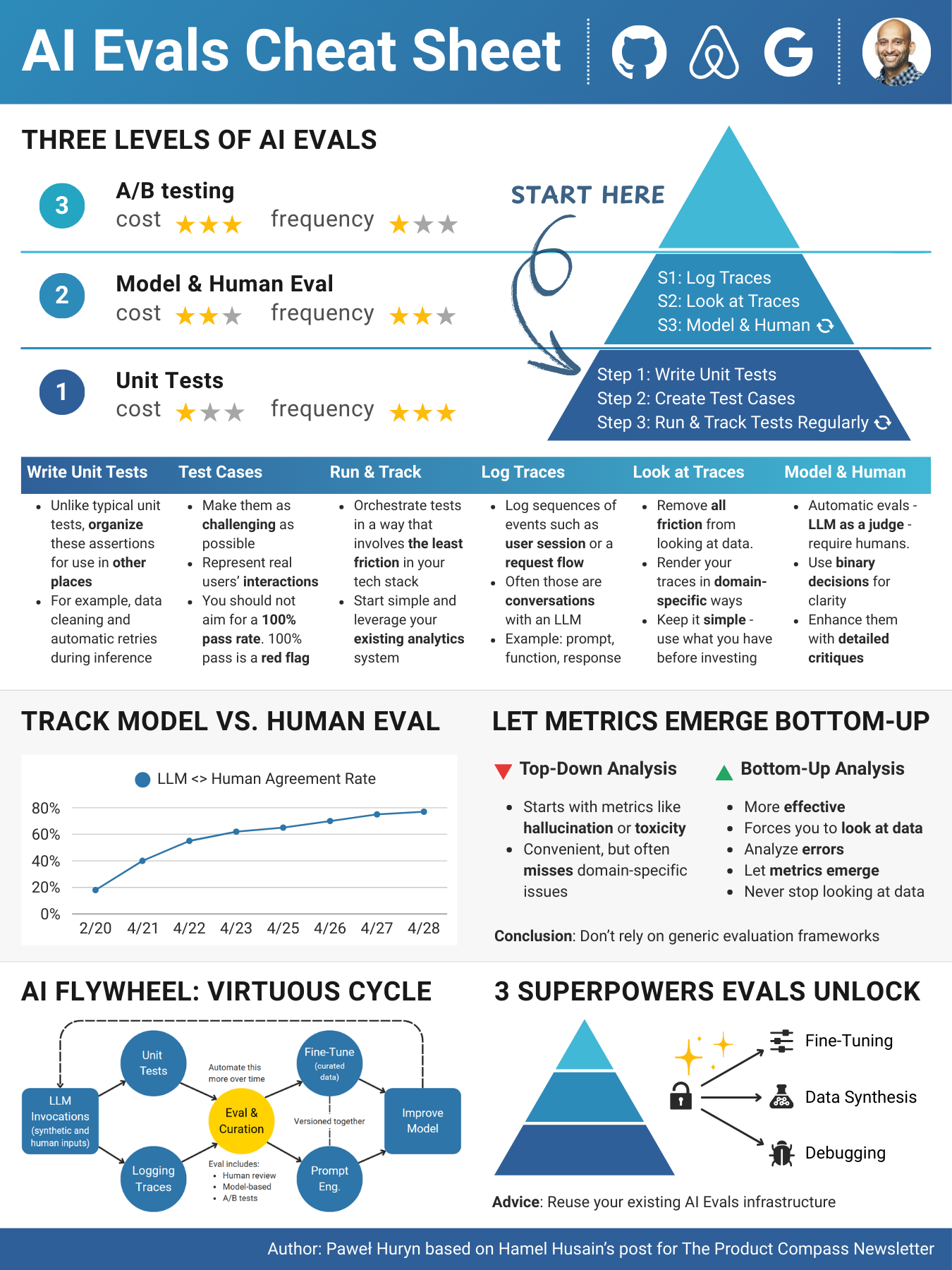Mastering AI Evals: A Complete Guide for PMs
AI Evals are emerging as the top skill for AI PMs. Best practices from 30+ companies and ready-to-use AI Eval templates.
Hey, Paweł here. Welcome to the free edition of The Product Compass Newsletter.
With 107,800+ PMs from companies like Meta, Amazon, Google, and Apple, this newsletter is the #1 source for learning and growth as an AI PM.
Consider subscribing and upgrading your account for the full experience:
Recently, subscribers kept asking me about AI Evals. Many say it's the most critical element of any AI initiative. Evals are emerging as the top skill for AI PMs.
As Garry Tan, CEO of Y Combinator, said:
Today’s guest is Hamel Husain, a recognized ML expert with 20 years of experience. He’s worked with companies like Airbnb and GitHub where he led early LLM research used by OpenAI for code understanding.
Hamel has also led and contributed to numerous popular open-source machine-learning tools.
Currently, he works as an independent consultant helping companies improve AI products through evals. Hamel is widely recognized for his expertise on evals and has unique perspectives on the topic.
In today’s issue, we discuss:
Why Do We Need AI Evals
AI Evals Flywheel: Virtuous Cycle
Three Levels of AI Evaluation
AI Eval Metrics: Bottom-Up vs. Top-Down Analysis
Three Free Superpowers Eval Systems Unlock
AI Eval Templates to Download
Conclusion
Before we proceed, I recommend AI Evals For Engineers & PMs course:
I've participated in the first cohort together with 700+ AI engineers and PMs. I have no doubt that every AI PM must understand evals in depth. And I agree with Teresa Torres:

The next cohort starts on January 26, 2026.
A special discount for our community you won’t find elsewhere:
1. Why Do We Need AI Evals
Hey, Hamel here. I started working with language models five years ago when I led the team that created CodeSearchNet, a precursor to GitHub CoPilot.
Since then, I’ve seen many successful and unsuccessful approaches to building LLM products. I’ve found that unsuccessful products almost always share a common root cause: a failure to create robust evaluation systems.
Here’s a common scene from my consulting work:
This scene has played out dozens of times over the last two years. Teams invest weeks building complex AI systems, but can’t tell me if their changes are helping or hurting.
This isn’t surprising. With new tools and frameworks emerging weekly, it’s natural to focus on tangible things we can control: which vector database to use, which LLM provider to choose, or which agent framework to adopt.
But after helping 30+ companies build AI products, I’ve discovered the teams who succeed barely talk about tools at all. Instead, they obsess over measurement and iteration.
In the next point, we discuss a case-study (one of my clients) where evals dramatically improved the AI product.
2. AI Evals Flywheel: Virtuous Cycle
Like software engineering, success with AI hinges on how fast you can iterate.
You must have processes and tools for:
Evaluating quality (e.g., tests)
Debugging issues (e.g., logging & inspecting data)
Changing the product’s behavior (e.g., prompt engineering, fine-tuning, coding)
Doing all three activities well creates a virtuous cycle differentiating great from mediocre AI products.
If you streamline your evaluation process, all other activities become easy.
This is very similar to how tests in software engineering pay massive dividends in the long term despite requiring up-front investment.
To ground this post in a real-world situation, I’ll walk through a case study in which we built a system for rapid improvement.
Case Study: Lucy, A Real Estate AI Assistant
Rechat is a SaaS application that allows real estate professionals to perform various tasks, such as managing contracts, searching for listings, building creative assets, managing appointments, and more in one place.
Rechat’s AI assistant, Lucy, is a canonical AI product: a conversational interface that obviates the need to click, type, and navigate the software.
During Lucy’s beginning stages, rapid progress was made with prompt engineering. But as Lucy’s surface area expanded, its performance plateaued:
Addressing one failure mode led to the emergence of others
There was limited visibility into the AI system’s effectiveness across tasks
Prompts expanded into long and unwieldy forms, attempting to cover numerous edge cases and examples
We faced a problem: How to systematically improve the AI?
To break through this plateau, we created a systematic approach to improving Lucy focused on evaluation:

Rigorous and systematic evaluation is the most important part of the whole system. You should spend most of your time making your evaluation more robust and streamlined.
I refer to components of this system in the next point.
3. Three Levels of AI Evaluation
There are three levels of evaluation to consider:
Level 1: Unit Tests
Level 2: Model & Human Eval (this includes debugging)
Level 3: A/B testing
The cost of Level 3 > Level 2 > Level 1. This dictates the way we execute them. For example, I usually:
Run Level 1 evals on every code change.
Run Level 2 on a set cadence, after tackling a good portion of my Level 1.
Run Level 3 only after significant product changes.
There isn’t a strict formula as to when to introduce each level of testing. When in doubt, use common sense.
3.1 Level 1: Unit Tests (Assertions)
Unit tests for LLMs are assertions (like you would write in pytest). Unlike typical unit tests, you want to organize these assertions for use in places beyond unit tests, such as data cleaning and automatic retries (using the assertion error to course-correct) during model inference.
The important part is that these assertions should run fast and cheaply as you develop your application so that you can run them every time your code changes.
If you have trouble thinking of assertions, you should critically examine your traces and failure modes. Also, do not shy away from using an LLM to help you brainstorm assertions!
Step 1: Write Unit Tests
The most effective way to think about unit tests is to break down the scope of your LLM into features and scenarios. For example, one feature of Lucy is the ability to find real estate listings, which we can break down into scenarios like so:
Feature: Listing Finder
This feature to be tested is a function call that responds to a user request to find a real estate listing. For example, “Please find listings with more than 3 bedrooms less than $2M in San Jose, CA”
The LLM converts this into a query that gets run against the CRM. The assertion then verifies that the expected number of results is returned.
To simplify, in our test suite, we have three user inputs that trigger each of the scenarios below, which then execute corresponding assertions:
There are also generic tests that aren’t specific to any one feature. For example, a generic test that ensures the none of the UUIDs (unique IDs from CRM) are mentioned in the output.
Rechat has hundreds of these unit tests. We continuously update them based on new failures we observe in the data as users challenge the AI or the product evolves.
These unit tests are crucial to getting feedback quickly when iterating on your AI system (prompt engineering, improving RAG, etc.). It is essential not to skip this step!
Step 2: Create Test Cases
To test these assertions, you must generate test cases or inputs that will trigger all scenarios you wish to test.
I often utilize an LLM to generate these inputs synthetically. For example, here is one such prompt Rechat uses to generate synthetic inputs for a feature that creates and retrieves contacts:
Write 50 different instructions that a real estate agent can give to his assistant to create contacts on his CRM. The contact details can include name, phone, email, partner name, birthday, tags, company, address and job.
For each of the instructions, you need to generate a second instruction which can be used to look up the created contact.
The results should be a JSON code block with only one string as the instruction like the following:
[
["Create a contact for John (johndoe@apple.com)",
"What's the email address of John Smith?"]
]Using the above prompt, we generate test cases like below:
[
[
'Create a contact for John Smith (johndoe@apple.com) with phone number 123-456-7890 and address 123 Apple St.',
'What\'s the email address of John Smith?'
],
[
'Add Emily Johnson with phone 987-654-3210, email emilyj@email.com, and company ABC Inc.',
'What\'s the phone number for Emily Johnson?'
],
[
'Create a contact for Tom Williams with birthday 10/20/1985, company XYZ Ltd, and job title Manager.',
'What\'s Tom Williams\' job title?'
]
]For each of these test cases, we execute the first user input to create the contact. We then execute the second query to fetch that contact. If the CRM doesn’t return exactly 1 result then we know there was a problem either creating or fetching the contact.
We can also run generic assertions like the one to verify UUIDs are not in the response.
You must constantly update these tests as you observe data through human evaluation and debugging. The key is to make these as challenging as possible while representing users’ interactions with the system.
You don’t need to wait for production data to test your system. You can make educated guesses about how users will use your product and generate synthetic data.
You can also let a small set of users use your product and let their usage refine your synthetic data generation strategy.
One signal you are writing good tests and assertions is when the model struggles to pass them. These failure modes become problems you can solve with techniques like fine-tuning later on.
On a related note, unlike traditional unit tests, you should not aim for a 100% pass rate. Your pass rate is a product decision, depending on the failures you are willing to tolerate. In fact, a 100% pass rate is a red flag.
Step 3: Run & Track Your Tests Regularly
There are many ways to orchestrate Level 1 tests. Rechat has been leveraging CI infrastructure (e.g., GitHub Actions, GitLab Pipelines, etc.) to execute these tests. But the tooling for this part of the workflow is nascent and evolving rapidly.
My advice is to orchestrate tests that involve the least friction in your tech stack.
In addition to tracking tests, you need to track the results of your tests over time so you can see if you are making progress. If you use CI (Continuous Integration), you should collect metrics along with versions of your tests/prompts outside your CI system for easy analysis and tracking.
I recommend starting simple and leveraging your existing analytics system to visualize your test results.
For example, Rechat uses Metabase to track their LLM test results over time. Below is a screenshot of a dashboard Rechat built with Metabase:

3.2 Level 2: Model & Human Eval
After you have built a solid foundation of Level 1 tests, you can move on to other forms of validation that cannot be tested by assertions alone.
A prerequisite to performing human and model-based eval is to log your traces.
Step 1: Logging Traces
A trace is a concept that has been around for a while in software engineering and is a log of a sequence of events such as user sessions or a request flow through a distributed system. In other words, tracing is a logical grouping of logs.
In the context of LLMs, traces often refer to conversations you have with an LLM. For example, a user message, followed by an AI response, followed by another user message, would be an example of a trace.
There are a growing number of solutions for logging LLM traces. Rechat uses LangSmith, which logs traces and allows you to view them in a human-readable way with an interactive playground to iterate on prompts.
Sometimes, logging your traces requires you to instrument your code. In this case, Rechat was using LangChain which automatically logs trace events to LangSmith for you.
Here is a screenshot of what this looks like:
I like LangSmith. It doesn’t require that you use LangChain and is intuitive and easy to use.
Searching, filtering, and reading traces are essential features for whatever solution you pick. I’ve found that some tools do not implement these functions correctly!
Step 2: Look at Your Traces
First, you must remove all friction from looking at data. This means rendering your traces in domain-specific ways.
I’ve often found that it’s better to build my own data viewing & labeling tool so I can gather all the information I need onto one screen.
In Lucy’s case, we needed to look at many sources of information (trace log, the CRM, etc.) to understand what the AI did. This is precisely the type of friction that needs to be eliminated. In Rechat’s case, this meant adding information like:
What tool (feature) & scenario was being evaluated.
Whether the trace resulted from a synthetic input or a real user input.
Filters to navigate between different tools and scenario combinations.
Links to the CRM and trace logging system for the current record.
I’ve built different variations of this tool for each problem I’ve worked on. Sometimes, I even need to embed another application to see what the user interaction looks like. Below is a screenshot of the tool we built to evaluate Rechat’s traces:
Step 3: Model & Human Eval
Another design choice specific to Lucy is that we noticed that many failures involved small mistakes in the final output of the LLM (format, content, etc). We decided to make the final output editable by a human so that we could curate & fix data for fine-tuning.
These tools can be built with lightweight front-end frameworks like Gradio, Streamlit, Panel, or Shiny in less than a day. The tool shown above was built with Shiny for Python.
Furthermore, there are tools like Lilac which uses AI to search and filter data semantically, which is incredibly handy for finding a set of similar data points while debugging an issue.
I often start by labeling examples as good or bad. I’ve found that assigning scores or more granular ratings is more difficult to manage than binary ratings.
There are advanced techniques you can use to make human evaluation more efficient or accurate (e.g., active learning, consensus voting, etc.), but I recommend starting with something simple.
Finally, like unit tests, you should organize and analyze your human-eval results to assess if you are progressing over time.
As discussed later, these labeled examples measure the quality of your system, validate automated evaluation, and curate high-quality synthetic data for fine-tuning.
How much data should you look at?
I often get asked how much data to examine. When starting, you should examine as much data as possible. I usually read traces generated from ALL test cases and user-generated traces at a minimum.
You can never stop looking at data. However, you can sample your data more over time, lessening the burden.
Track correlation between model-based and human evaluation
Many vendors want to sell you tools that claim to eliminate the need for a human to look at the data. But having humans periodically evaluate at least a sample of traces is a good idea.
I often find that “correctness” is somewhat subjective, and you must align the model with a human.
You should track the correlation between model-based and human evaluation to decide how much you can rely on automatic evaluation.
Furthermore, by collecting critiques from labelers explaining why they are making a decision, you can iterate on the evaluator model to align it with humans through prompt engineering or fine-tuning. However, I tend to favor prompt engineering for evaluator model alignment.
I love using low-tech solutions like Excel to iterate on aligning model-based eval with humans.
For example, I sent my colleague Phillip the following spreadsheet every few days to grade for a different use-case involving a natural language query generator.
This spreadsheet would contain the following information:
model response: this is the prediction made by the LLM.
model critique: this is a critique written by a (usually more powerful) LLM about your original LLM’s prediction.
model outcome: this is a binary label the critique model assigns to the
model responseas being “good” or “bad.”
Phillip then fills out his version of the same information - meaning his critique, outcome, and desired response for 25-50 examples at a time (these are the columns prefixed with “phillip” below):

This information allowed me to iterate on the prompt of the critique model to make it sufficiently aligned with Phillip over time. This is also easy to track in a low-tech way in a spreadsheet:

This is a screenshot of a spreadsheet where we recorded our attempts to align model-based eval with a human evaluator.
General tips on model-based eval:
Use the most powerful model you can afford. It often takes advanced reasoning capabilities to critique something well. You can often get away with a slower, more powerful model for critiquing outputs relative to what you use in production.
You must maintain an additional mini-evaluation system to track model-based evaluation quality. I have sometimes fine-tuned a model at this stage (but I try not to).
After bringing the model-based evaluator in line with the human, you must continue doing periodic exercises to monitor the model and human agreement.
My favorite aspect about creating a good evaluator model is that its critiques can be used to curate high-quality synthetic data, which I will touch upon later.
3.3 Level 3: A/B Testing
Finally, it is always good to perform A/B tests to ensure your AI product is driving user behaviors or outcomes you desire. A/B testing for LLMs compared to other types of products isn’t too different.
If you want to learn more about A/B testing, I recommend reading the Eppo blog (which was created by colleagues I used to work with who are rock stars in A/B testing).
It’s okay to put this stage off until you are sufficiently ready and convinced that your AI product is suitable for showing to real users. This level of evaluation is usually only appropriate for more mature products.
3.4 Evaluating RAG
Aside from evaluating your system as a whole, you can evaluate sub-components of your AI, like RAG. Evaluating RAG is beyond the scope of this post, but you can learn more about this subject in a post by Jason Liu.
4. AI Eval Metrics: Bottom-Up vs. Top-Down Analysis
When identifying error types, you can take either a “top-down” or “bottom-up” approach.
The top-down approach starts with common metrics like “hallucination” or “toxicity” plus metrics unique to your task. While convenient, it often misses domain-specific issues.
The more effective bottom-up approach forces you to look at actual data and let metrics naturally emerge.
At NurtureBoss, we started with a spreadsheet where each row represented a conversation. We wrote open-ended notes on any undesired behavior.
Then we used an LLM to build a taxonomy of common failure modes. Finally, we mapped each row to specific failure mode labels and counted the frequency of each issue.
The results were striking - just three issues accounted for over 60% of all problems:
Conversation flow issues (missing context, awkward responses)
Handoff failures (not recognizing when to transfer to humans)
Rescheduling problems (struggling with date handling)
The impact was immediate. The team had uncovered so many actionable insights that they needed several weeks just to implement fixes for the problems we’d already found.
If you want to learn more about this approach, see this video with an explanation from Jacob Carter, founder of NurtureBoss:
5. Three Free Superpowers Eval Systems Unlock
In addition to iterating fast, eval systems unlock the ability to fine-tune and debug, which can take your AI product to the next level.
5.1 Fine-Tuning
Rechat resolved many failure modes through fine-tuning that were not possible with prompt engineering alone.
Fine-tuning is best for learning syntax, style, and rules, whereas techniques like RAG supply the model with context or up-to-date facts.
99% of the work involved with fine-tuning is preparing high-quality data that covers your AI product’s surface area. But if you have a solid evaluation system, you already have a robust data generation and curation engine.
5.2 Data Synthesis & Curation
To illustrate why data curation and synthesis come nearly for free once you have an evaluation system, consider the case where you want to create additional fine-tuning data for the listing finder mentioned earlier.
First, you can use LLMs to generate synthetic data with a prompt like this:
Imagine if Zillow was able to parse natural language. Come up with 50 different ways users would be able to search listings there. Use real names for cities and neighborhoods.
You can use the following parameters:
<ommitted for confidentiality>
Output should be a JSON code block array. Example:
[
"Homes under $500k in New York"
]This is almost identical to the exercise for producing test cases! You can then use your Level 1 & Level 2 tests to filter out undesirable data that fails assertions or that the critique model thinks are wrong. You can also use your existing human evaluation tools to look at traces to curate traces for a fine-tuning dataset.
5.3 Debugging
When you get a complaint or see an error related to your AI product, you should be able to debug this quickly. If you have a robust evaluation system, you already have:
A database of traces that you can search and filter.
A set of mechanisms (assertions, tests, etc) that can help you flag errors and bad behaviors.
Log searching & navigation tools that can help you find the root cause of the error. For example, the error could be RAG, a bug in the code, or a model performing poorly.
The ability to make changes in response to the error and quickly test its efficacy.
In short, there is an incredibly large overlap between the infrastructure needed for evaluation and that for debugging.
6. AI Eval Templates to Download
Hey, Paweł here. I have prepared two templates to download.
6.1 Manual AI Evaluation Spreadsheet
This template is based on “3.2 Level 2: Model & Human Eval:”
6.2 Premium: LLM Evals Data Review App Template
A generic web app build with Lovable that allows users to:
Review LLM traces
Evaluate LLM traces
Preview model-based evals (in the Metadata)
Track correlation between model-based and human evaluation
Import / export data
A ready-to-use template: https://lovable.dev/projects/d3935db6-e1a4-4ad2-9007-dc6504aab66c
By Tuesday, I'll also share a video on how to create that system step-by-step.
[Edited] It’s here:
7. Conclusion
Evaluation systems create a flywheel that allows you to iterate very quickly. It’s almost always where people get stuck when building AI products.
I hope this post gives you an intuition on how to go about building your evaluation systems.
Some key takeaways to keep in mind:
Remove ALL friction from looking at data.
Keep it simple. Don’t buy fancy LLM tools. Use what you have first.
You are doing it wrong if you aren’t looking at lots of data.
Don’t rely on generic evaluation frameworks to measure the quality of your AI. Instead, create an evaluation system specific to your problem.
Write lots of tests and frequently update them.
Binary decisions provide more clarity than more complex scales. Enhance those binary judgements with detailed critiques.
LLMs can be used to unblock the creation of an eval system. Examples include using a LLM to:
Generate test cases and write assertions.
Generate synthetic data.
Critique and label data etc.
Re-use your eval infrastructure for debugging and fine-tuning.
AI Evals are complex, yet the most impactful investment you can make in your product. And they are emerging as the most important skill for AI PMs.
If you want to learn more, consider joining my AI Evals For Engineers & PMs cohort.
The next session starts on January 26 2026. A special 25% discount for your community:
Thanks for Reading The Product Compass Newsletter
Hey, Paweł here, again. It’s great to explore, learn, and grow together.
[Edited]
As someone noted on X, it's sad that many PMs still don’t realize that it’s not just engineers who need to evaluate LLMs.
Everyone understands that a PM needs to be data-literate. Sometimes we work with analytics, funnels, cohorts, etc. daily.
Similarly, you can't work on an AI-powered product without analyzing traces, identifying errors, understanding synthetic data, providing feedback, and using common language.
Hope this post helps.
We will be diving into evals in the future.
—
An infographic for you to download:
—
And here are some other AI PM posts you might have missed:
Have an awesome weekend and a fantastic week ahead!
Paweł



















